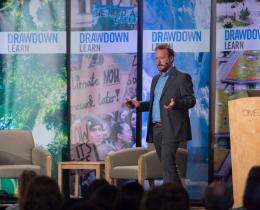Chad Frischmann is a co-author and the lead researcher of the New York Times best-seller Drawdown: The Most Comprehensive Plan Ever Proposed to Reverse Global Warming.
Drawdown was the #1 best-selling environmental book of 2017 and is currently being translated into more than 10 languages. In collaboration with a global team of researchers, Frischmann designed integrated global models to assess the world’s most effective climate solutions and determine if, when, and how the world can reach “drawdown,” the point in time when the concentration of atmospheric greenhouse gases begins to decline on a year-to-year basis.
With an interdisciplinary background in public policy, human rights, sustainable development, and environmental conservation, Frischmann works as a systems strategist to build a new, regenerative future with cascading benefits to the environment and to human well-being. As head of research and technology since Project Drawdown’s inception, Frischmann is a key spokesperson and coalition-builder dedicated to sharing the message and model of Drawdown with the world.
Frischmann provides a systems-based, action-orientated approach to research and strategic leadership. Previously, as the senior program officer at The Europaeum, an association of leading European universities, Frischmann worked to further international collaboration through academic mobility and exchange between students, researchers, and those working in the public and private sectors. He taught at the University of Oxford and the University of California at Berkeley; and worked as a consultant and researcher for numerous organizations, from small grassroots non-profits to international agencies such as UNESCO, the International Work Group on Indigenous Affairs, and the International Fund for Agricultural Development.
Frischmann's talks have been featured at the University of Oxford, Harvard, the COP23 in Bonn, the World Business Council on Sustainable Development (WBCSD), the University of California at Berkeley, the Carbon Leadership Forum, the University of Washington, the Massachusetts Institute of Technology, the Dutch Sustainability Congress, the MAD Symposium, the Global Sustainable Technology & Innovation Conference, the International Conference on Sustainable Development, and TED Global’s "We the Future," among others.


